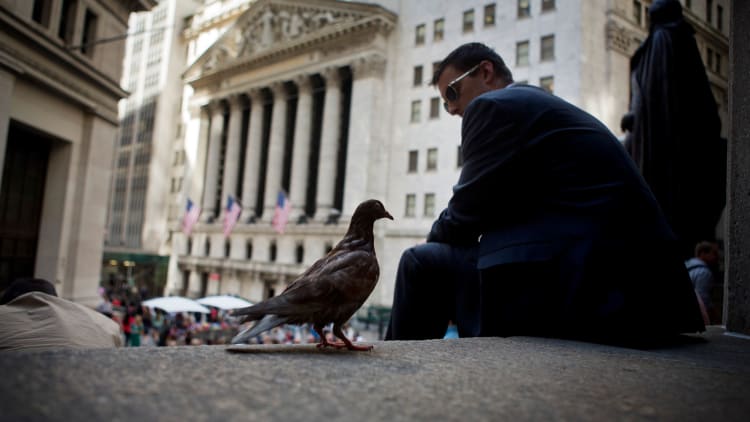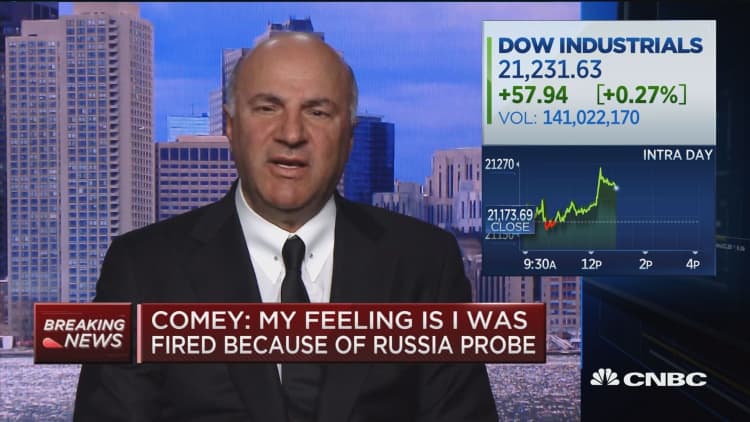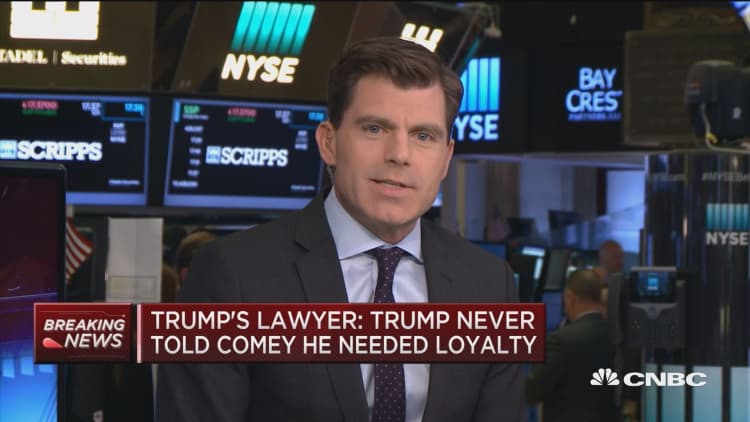
The low volatility plaguing the market looks here to stay, after traders hoping for a spike this week got the opposite.
The CBOE Volatility Index (.VIX), considered the best gauge of fear in the market, dropped Friday to 9.37, its lowest since Dec. 27, 1993.
The decline comes even after U.K. Prime Minister Theresa May's Conservative Party lost its majority in a snap election. The VIX had briefly fallen below 9.90 Thursday after former FBI Director James Comey's highly anticipated testimony before the Senate Intelligence Committee.
"The VIX tells me what I need to know. The market doesn't care," Kevin O'Leary, chairman of O'Shares Investments and O'Leary Ventures, said Thursday on CNBC's "Halftime Report."
"I put a lot of weight into the VIX. I got nothing back for it. There's no volatility here, and it's starting to get boring," O'Leary said. The "Shark Tank" investor in April backed out of a race to win the leadership of Canada's Conservative Party.
Ahead of Comey's testimony, O'Leary said he bought iPath S&P 500 VIX Short-Term Futures ETN (VXX). The exchange-traded note has fallen more than 2 percent this week and is off nearly 50 percent year to date.

Heading into Thursday's session, Wall Street readied for potential market-moving announcements from the European Central Bank and its president, Mario Draghi; Comey's testimony; and the U.K. general election.
"Any hedges that were still on are coming off today," said Peter Tchir, head of macro strategy at Brean Capital. "Certainly a chance of a volatility spike is reduced."
On Wednesday, the VIX, generally considered the best gauge of fear in the market, rose to 10.93, its highest since May 31. The VIX measures the buying of put and call options on the S&P 500 near-term options. Puts and calls give the buyers the right to sell or acquire an asset, respectively, at a preset price.
Friday's decline marks the 17th day this year the VIX has traded below 10, accounting for nearly half of the 35 occurrences on record going back to 1990.
"A low VIX is never a reason to abandon ship on the stock market. It is simply a reflection of a quiet market.The VIX can remain 'low' for months/years before a major correction occurs," said Mark Arbeter, president of Arbeter Investments.
VIX quarter-to-date performance
Source: FactSet
It wasn't just stocks that saw little action. Trading across major asset classes remained muted Thursday.
By midday New York time, the euro-dollar was back above session lows hit in the morning during Draghi's news conference. Major European stock indexes closed mixed. Oil steadied, settling just 8 cents lower after falling more than 5 percent Wednesday.
U.S. stocks mostly traded in a narrow range, except for a brief period during Comey's testimony when the Dow Jones industrial average climbed to a record high.
Comey said Thursday he kept memos on President Donald Trump because he thought Trump might "lie." However, the nearly three-hour question-and-answer session didn't spark any new debate about Trump's ability to follow through on pro-growth promises. Traders also got a hint of what the former FBI director would say when his written testimony was released Wednesday afternoon.
"Everyone was glued to the hearing, and it was more theater than anything else," said Arthur Bass, managing director, fixed income financing, futures and rates, at Wedbush Securities.
"The underlying element behind all this from an economic standpoint is how likely are we ... to get economic stimulus," Bass said.
Stocks surged to record highs after President Donald Trump won the election in November as traders bet on promised stimulus from tax reform, infrastructure spending and deregulation.
In mid-May, the S&P 500 posted its worst day since September, after a report based on a memo from Comey alleged Trump asked Comey to drop an investigation into former national security advisor Michael Flynn for potential connections to Russia. A senior White House official said in a statement to NBC News that the report was inaccurate.
All three major U.S. indexes had recovered to reach all-time highs by early June and hit records Friday.
Comey's written testimony Wednesday reiterated that he believed the president wanted him to "drop" the Flynn investigation.
"A lot of the information has already been priced into the markets," said Dan Deming, managing director at KKM Financial. "The times the markets have reacted violently to political news events has been when the unexpected has happened."
Deming also pointed out traders may be anticipating typically low levels of volatility during the first week of July, right around the Independence Day holiday on July 4.
— CNBC's Gina Francolla and Chris Hayes contributed to this report.
Disclosure: CNBC owns the exclusive off-network cable rights to "Shark Tank."
Watch: Santoli says Trump policy no more stalled than before



